最新人教版五年级英语下册全册知识点总结
- 格式:docx
- 大小:19.61 KB
- 文档页数:11
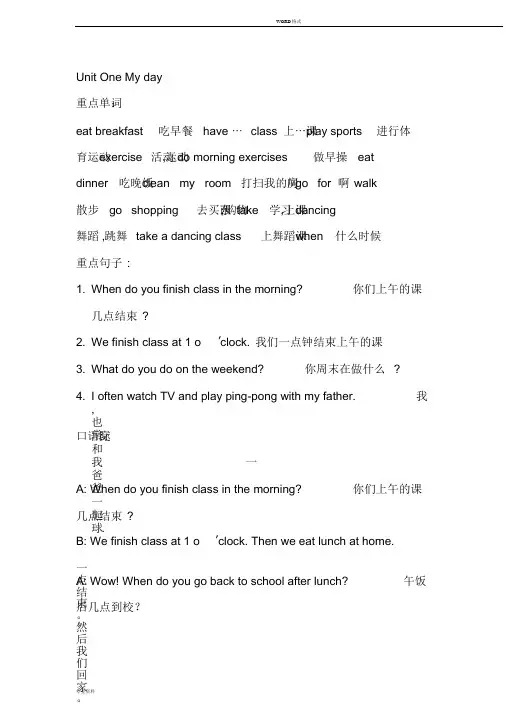
Unit One My day 重点单词: eat breakfast吃早餐 have ⋯ class 上⋯课p lay sports 进行体育运动e xercise 活动,运动d o morning exercises做早操 eatdinner 吃晚饭c lean my room 打扫我的房间go for 啊 walk 散步 go shopping去买东西,购物t ake 学习,上课d ancing舞蹈 ,跳舞 take a dancing class 上舞蹈课w hen 什么时候重点句子 :1. When do you finish class in the morning? 你们上午的课几点结束 ?2. We finish class at 1 o’clock. 我们一点钟结束上午的课.3. What do you do on the weekend?你周末在做什么 ?4. I often watch TV and play ping-pong with my father. 我 ,也常和我爸爸一起球.口语交际: 一 A: When do you finish class in the morning? 你们上午的课 几点结束 ? B: We finish class at 1 o ’clock. Then we eat lunch at home. 一点结束。
然后我们回A: Wow! When do you go back to school after lunch? 午饭后几点到校?B: At 2:30. Classes start at 3 o ’clock. 两点半到校,三点上课。
A: When do you usually eat dinner in Spain? 在西班牙你们通常几点吃晚饭?B: Usually at 9:30 or 10 o ’clock. 通常在九点半或十点。
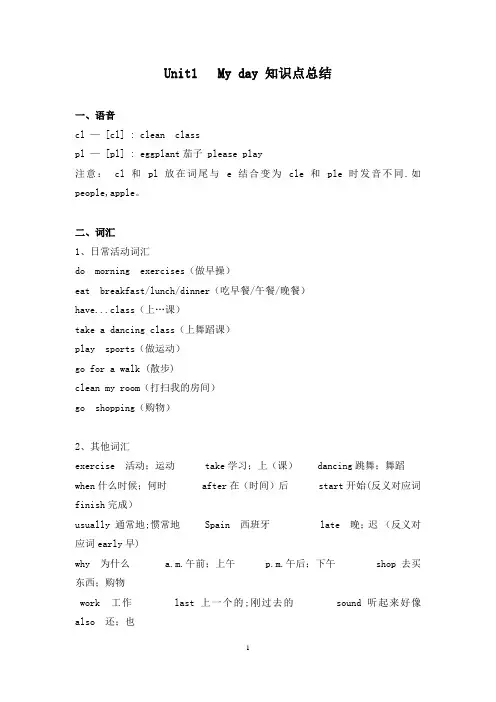
Unit1 My day 知识点总结一、语音cl — [cl] : clean classpl — [pl] : eggplant茄子 please play注意:cl 和 pl 放在词尾与 e 结合变为cle 和 ple 时发音不同.如people,apple。
二、词汇1、日常活动词汇do morning exercises(做早操)eat breakfast/lunch/dinner(吃早餐/午餐/晚餐)have...class(上…课)take a dancing class(上舞蹈课)play sports(做运动)go for a walk (散步)clean my room(打扫我的房间)go shopping(购物)2、其他词汇exercise 活动;运动 take学习;上(课)dancing跳舞;舞蹈when什么时候;何时 after在(时间)后 start开始(反义对应词finish完成)usually 通常地;惯常地 Spain 西班牙 late 晚;迟(反义对应词early早)why 为什么 a.m.午前;上午 p.m.午后;下午 shop去买东西;购物work 工作 last上一个的;刚过去的 sound听起来好像also 还;也busy 忙的need 需要play 戏剧剧本 letter 信Live 居住island 岛always 总是;一直 cave 山洞;洞穴go swimming 去游泳win 获胜。
三、句型以及语法知识点1、询问别人什么时候做某事某种活动的when特殊疑问句型,使用时间短语回答。
When do you do morning exercises? 你何时做早操?I do morning exercises at 7:00.我七点钟做早操。
When do you finish class in the morning? 你们上午的课到什么时候结束?We finish class at 1 o’clock.我们一点钟结束上午的课。
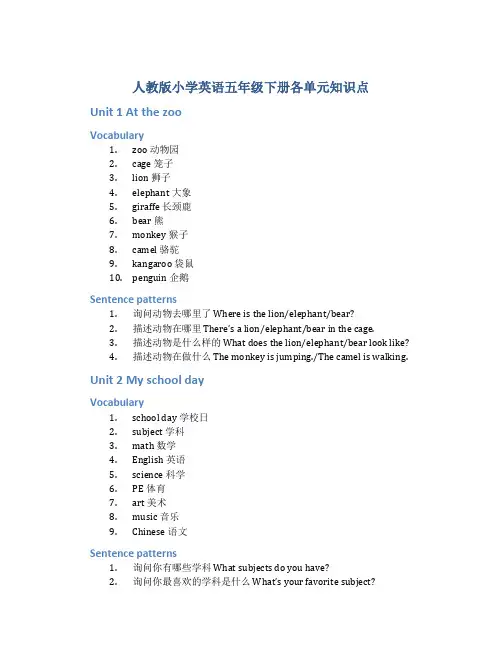
人教版小学英语五年级下册各单元知识点Unit 1 At the zooVocabulary1.zoo 动物园2.cage 笼子3.lion 狮子4.elephant 大象5.giraffe 长颈鹿6.bear 熊7.monkey 猴子8.camel 骆驼9.kangaroo 袋鼠10.penguin 企鹅Sentence patterns1.询问动物去哪里了 Where is the lion/elephant/bear?2.描述动物在哪里There’s a lion/elephant/bear in the cage.3.描述动物是什么样的 What does the lion/elephant/bear look like?4.描述动物在做什么 The monkey is jumping./The camel is walking. Unit 2 My school dayVocabulary1.school day 学校日2.subject 学科3.math 数学4.English 英语5.science 科学6.PE 体育7.art 美术8.music 音乐9.Chinese 语文Sentence patterns1.询问你有哪些学科 What subjects do you have?2.询问你最喜欢的学科是什么What’s your favorite subject?3.描述你正在上什么学科I’m having math/English/science class now.4.询问你在哪个班级 What class are you in?Unit 3 At a partyVocabulary1.party 派对2.balloon 气球3.present 礼物4.birthday 生日5.cake 蛋糕6.candle 蜡烛7.card 卡片Sentence patterns1.询问你们在庆祝什么 What are you celebrating?2.询问你送了什么礼物 What present did you bring?3.描述蛋糕上有多少个蜡烛 There are four candles on the cake.4.描述你在派对上吃了什么 I ate cake and drank soda.Unit 4 My clothesVocabulary1.clothes 衣服2.jacket 夹克衫3.shirt 衬衫4.dress 连衣裙5.skirt 短裙6.pants 裤子7.socks 袜子8.shoes 鞋子Sentence patterns1.询问你喜欢穿什么样的衣服 What clothes do you like to wear?2.询问今天你穿了什么衣服 What clothes are you wearing today?3.描述你的外套是什么样的 My jacket is blue.4.描述你的鞋子是什么颜色的 My shoes are red.Unit 5 My familyVocabulary1.family 家庭2.mother 母亲3.father 父亲4.sister 姐妹5.brother 兄弟6.grandmother 奶奶7.grandfather 爷爷8.aunt 阿姨9.uncle 叔叔Sentence patterns1.询问你有几口人家庭 How many people are there in your family?2.询问你和家人一起住吗 Do you live with your family?3.描述你的妈妈是什么样的 My mother is kind.4.描述你和兄弟姐妹的关系很好 My sister and I get along well.。
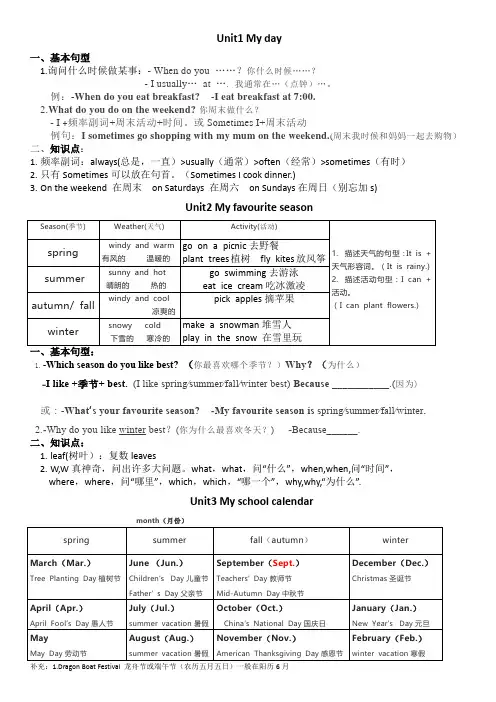
Unit1 My day一、基本句型1.询问什么时候做某事:- When do you ……?你什么时候……?- I usually…at …. 我通常在…(点钟)…。
例:-When do you eat breakfast?-I eat breakfast at 7:00.2.What do you do on the weekend?你周末做什么?- I +频率副词+周末活动+时间。
或Sometimes I+周末活动例句:I sometimes go shopping with my mum on the weekend.(周末我时候和妈妈一起去购物)二、知识点:1.频率副词:always(总是,一直)>usually(通常)>often(经常)>sometimes(有时)2.只有Sometimes可以放在句首。
(Sometimes I cook dinner.)3.On the weekend 在周末on Saturdays 在周六on Sundays在周日(别忘加s)Unit2 My favourite season1.-Which season do you like best? (你最喜欢哪个季节?)Why?(为什么)-I like +季节+ best.(I like spring∕summer∕fall∕winter best) Because ___________.(因为)或:-What‘s your favourite season? -My favourite season is spring∕summer∕fall∕winter.2.-Why do you like winter best?(你为什么最喜欢冬天?) -Because______.二、知识点:1.leaf(树叶):复数leaves2.W,W真神奇,问出许多大问题。
what,what,问“什么”,when,when,问“时间”,where,where,问“哪里”,which,which,“哪一个”,why,why,“为什么”.Unit3 My school calendar补充:1.Dragon Boat Festival 龙舟节或端午节(农历五月五日)一般在阳历6月2.月份首字母大写。
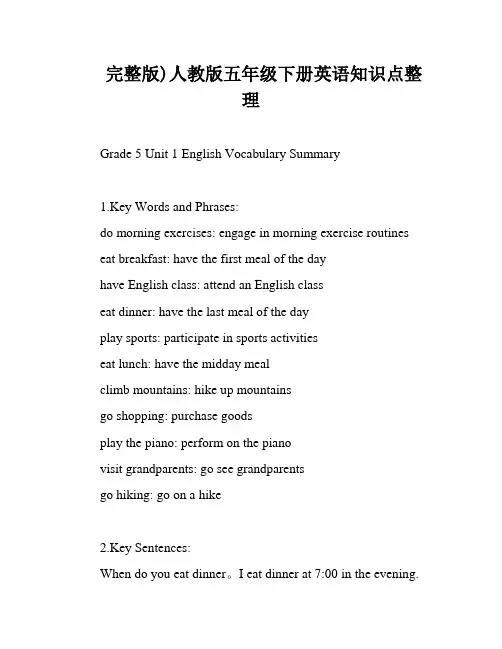
完整版)人教版五年级下册英语知识点整理Grade 5 Unit 1 English Vocabulary Summary1.Key Words and Phrases:do morning exercises: engage in morning exercise routines eat breakfast: have the first meal of the dayhave English class: attend an English classeat dinner: have the last meal of the dayplay sports: participate in sports activitieseat lunch: have the midday mealclimb mountains: hike up mountainsgo shopping: purchase goodsplay the piano: perform on the pianovisit grandparents: go see grandparentsgo hiking: go on a hike2.Key Sentences:When do you eat dinner。
I eat dinner at 7:00 in the evening.When do you get up。
I usually get up at 12:00 at noon.What do you do on the weekend。
Usually。
I watch TV and go shopping。
Sometimes。
I go hiking.I often play football.3.Important Points:Synonyms: eat breakfast - have breakfast。
eat lunch - have lunch。
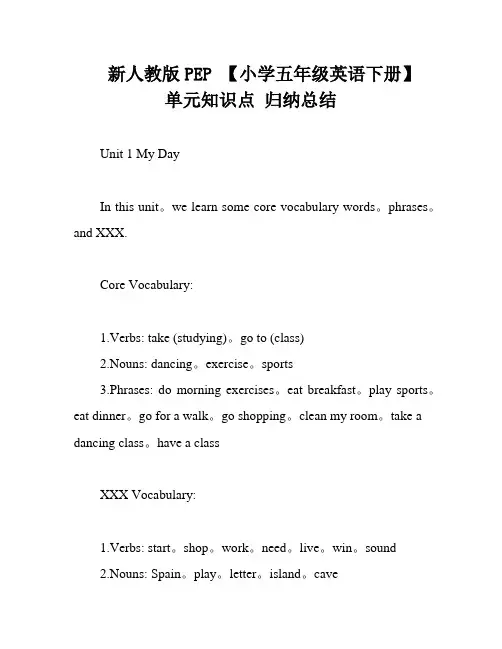
新人教版PEP 【小学五年级英语下册】单元知识点归纳总结Unit 1 My DayIn this unit。
we learn some core vocabulary words。
phrases。
and XXX.Core Vocabulary:1.Verbs: take (studying)。
go to (class)2.Nouns: dancing。
exercise。
sports3.Phrases: do morning exercises。
eat breakfast。
play sports。
eat dinner。
go for a walk。
go shopping。
clean my room。
take a dancing class。
have a classXXX Vocabulary:1.Verbs: start。
shop。
work。
need。
live。
win。
sound2.Nouns: Spain。
play。
letter。
island。
cave3.ns: after4.XXX: when。
XXX。
a.m。
p.m。
why。
last。
also。
busy5.nal Vocabulary: frequency adverbs (always。
usually。
sometimes)Phrases:watch TV。
eat lunch。
go to bed。
go swimming。
go home。
go to schoolCore Sentence Structure:When do you do morning exercises?" "At 7 o'clock."XXX phrase is "good job" to praise XXX.Which season do you like best。
I like winter best。
This sentence means "which one do you like the most" and "like。
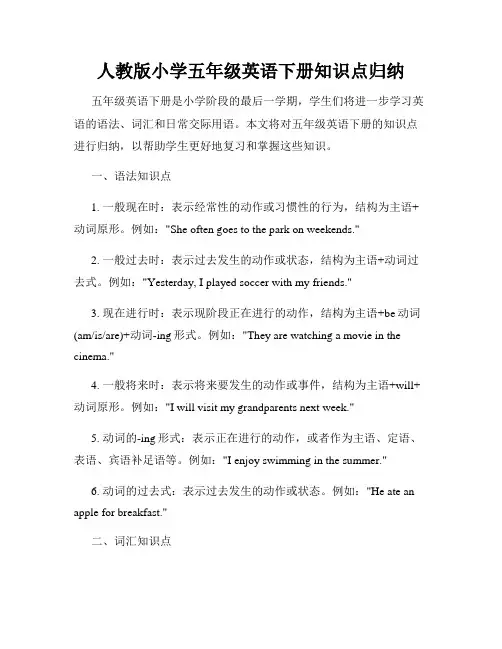
人教版小学五年级英语下册知识点归纳五年级英语下册是小学阶段的最后一学期,学生们将进一步学习英语的语法、词汇和日常交际用语。
本文将对五年级英语下册的知识点进行归纳,以帮助学生更好地复习和掌握这些知识。
一、语法知识点1. 一般现在时:表示经常性的动作或习惯性的行为,结构为主语+动词原形。
例如:"She often goes to the park on weekends."2. 一般过去时:表示过去发生的动作或状态,结构为主语+动词过去式。
例如:"Yesterday, I played soccer with my friends."3. 现在进行时:表示现阶段正在进行的动作,结构为主语+be动词(am/is/are)+动词-ing形式。
例如:"They are watching a movie in the cinema."4. 一般将来时:表示将来要发生的动作或事件,结构为主语+will+动词原形。
例如:"I will visit my grandparents next week."5. 动词的-ing形式:表示正在进行的动作,或者作为主语、定语、表语、宾语补足语等。
例如:"I enjoy swimming in the summer."6. 动词的过去式:表示过去发生的动作或状态。
例如:"He ate an apple for breakfast."二、词汇知识点1. 数字:学习1-100的基本数字,以及基本的数学运算符号。
例如:"5 + 3 = 8."2. 季节和月份:学习四季和每个月份的英文表达,以及与之相关的天气和活动。
例如:"In winter, it often snows. We can go skiing."3. 食物:学习常见食物的英文表达,以及与之相关的问答句型。
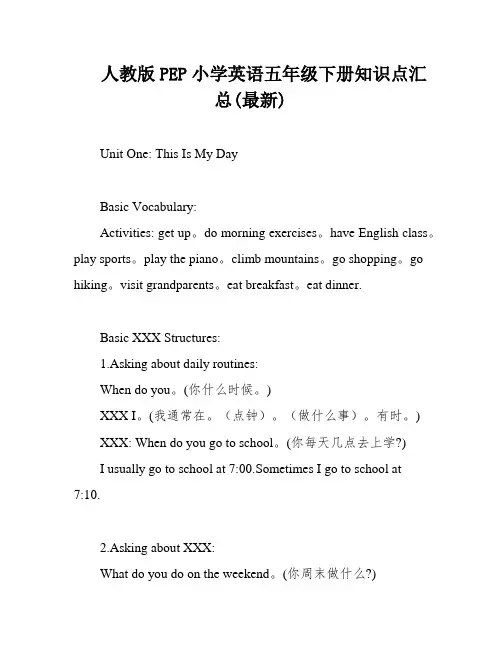
人教版PEP小学英语五年级下册知识点汇总(最新)Unit One: This Is My DayBasic Vocabulary:Activities: get up。
do morning exercises。
have English class。
play sports。
play the piano。
climb mountains。
go shopping。
go hiking。
visit grandparents。
eat breakfast。
eat dinner.Basic XXX Structures:1.Asking about daily routines:When do you。
(你什么时候。
)XXX I。
(我通常在。
(点钟)。
(做什么事)。
有时。
)XXX: When do you go to school。
(你每天几点去上学?)I usually go to school at 7:00.Sometimes I go to school at7:10.2.Asking about XXX:What do you do on the weekend。
(你周末做什么?)XXX I。
(我通常/经常。
有时。
)XXX: What do you do on the weekend?I often play XXX I go shopping with my mom.3.Introducing one's own habits:Every weekend。
I go hiking。
(我每个周末远足。
)Every day。
I do my homework at 8:00 in the evening。
(我每天晚上8点做作业。
)4.Asking XXX:What do you do。
(你是干什么的?)Time:morning。
afternoon。
evening。
noon。
at night。
6:00.on Sunday。
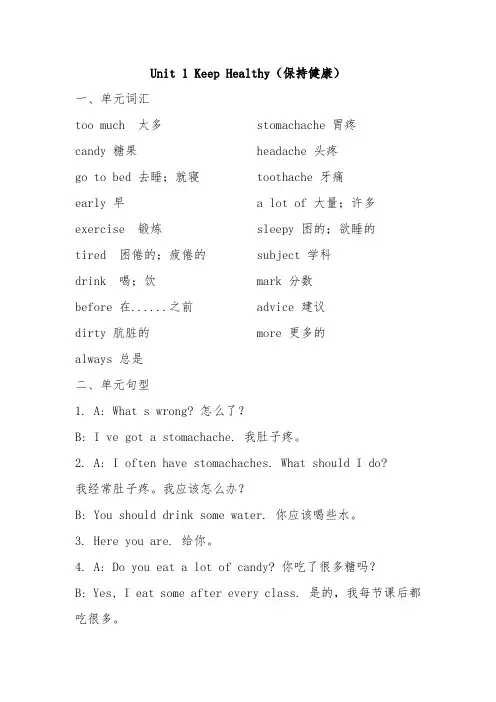
Unit 1 Keep Healthy(保持健康)一、单元词汇too much 太多candy 糖果go to bed 去睡;就寝early 早exercise 锻炼tired 困倦的;疲倦的drink 喝;饮before 在......之前dirty 肮脏的always 总是stomachache 胃疼headache 头疼toothache 牙痛a lot of 大量;许多sleepy 困的;欲睡的subject 学科mark 分数advice 建议more 更多的二、单元句型1. A: What s wrong? 怎么了?B: I ve got a stomachache. 我肚子疼。
2. A: I often have stomachaches. What should I do?我经常肚子疼。
我应该怎么办?B: You should drink some water. 你应该喝些水。
3. Here you are. 给你。
4. A: Do you eat a lot of candy? 你吃了很多糖吗?B: Yes, I eat some after every class. 是的,我每节课后都吃很多。
5. You shouldn t eat too much candy. 你不该吃太多糖。
6. A: Do you wash your hands before eating? 你饭前洗手了吗?B: Not always. 不总洗。
7. You shouldn t eat with dirty hands. 你不该用脏手吃饭。
8. You should always wash your hands before eating.你应该坚持饭前洗手。
9. I always feel tired and sleepy. 我总觉得很累很困。
10. I have some advice for you. 我给你一些建议。
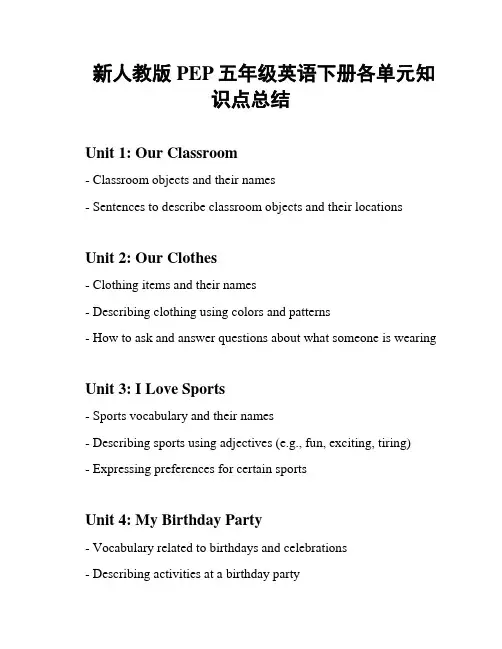
新人教版PEP五年级英语下册各单元知识点总结Unit 1: Our Classroom- Classroom objects and their names- Sentences to describe classroom objects and their locationsUnit 2: Our Clothes- Clothing items and their names- Describing clothing using colors and patterns- How to ask and answer questions about what someone is wearingUnit 3: I Love Sports- Sports vocabulary and their names- Describing sports using adjectives (e.g., fun, exciting, tiring)- Expressing preferences for certain sportsUnit 4: My Birthday Party- Vocabulary related to birthdays and celebrations- Describing activities at a birthday party- Expressing likes and dislikes about different party elementsUnit 5: At the Farm- Vocabulary related to farm animals and their names- Describing farm animals using adjectives (e.g., big, small, noisy) - Describing activities at a farm (e.g., feeding animals, milking cows)Unit 6: A Fun Day Out- Vocabulary related to amusement park rides and activities- Describing activities and experiences at an amusement park- Expressing likes and dislikes about different rides and activitiesUnit 7: A Friendly Letter- Vocabulary related to writing a letter (e.g., greeting, closing, signature)- Structure of a friendly letter- Writing a letter to a friend, describing personal experiences or activitiesUnit 8: Our Pets- Vocabulary related to pets and their names- Describing pets using adjectives (e.g., cute, friendly, playful)- Talking about responsibilities and caring for petsUnit 9: Our Earth- Vocabulary related to the environment and nature- Describing different natural elements (e.g., mountains, rivers, plants)- Expressing concerns and suggesting actions to protect the environmentUnit 10: Fun with Art- Vocabulary related to art and artistic activities- Describing different art forms (e.g., drawing, painting, sculpting) - Talking about personal preferences for different art activitiesUnit 11: Let's Travel- Vocabulary related to travel and transportation- Describing different modes of transportation (e.g., car, train, airplane)- Talking about travel experiences and preferences for different destinationsUnit 12: Healthy Habits- Vocabulary related to health and healthy habits- Describing different healthy habits (e.g., exercise, balanced diet, enough sleep)- Talking about personal choices and habits for a healthy lifestyle。
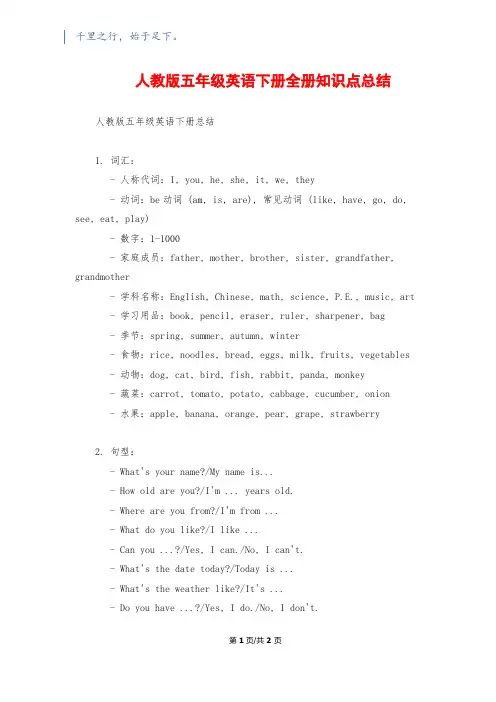
千里之行,始于足下。
人教版五年级英语下册全册知识点总结人教版五年级英语下册总结1. 词汇:- 人称代词:I, you, he, she, it, we, they- 动词:be动词 (am, is, are), 常见动词 (like, have, go, do, see, eat, play)- 数字:1-1000- 家庭成员:father, mother, brother, sister, grandfather, grandmother- 学科名称:English, Chinese, math, science, P.E., music, art - 学习用品:book, pencil, eraser, ruler, sharpener, bag- 季节:spring, summer, autumn, winter- 食物:rice, noodles, bread, eggs, milk, fruits, vegetables - 动物:dog, cat, bird, fish, rabbit, panda, monkey- 蔬菜:carrot, tomato, potato, cabbage, cucumber, onion- 水果:apple, banana, orange, pear, grape, strawberry2. 句型:- What's your name?/My name is...- How old are you?/I'm ... years old.- Where are you from?/I'm from ...- What do you like?/I like ...- Can you ...?/Yes, I can./No, I can't.- What's the date today?/Today is ...- What's the weather like?/It's ...- Do you have ...?/Yes, I do./No, I don't.第1页/共2页锲而不舍,金石可镂。
人教版五年级下英语知识点人教版五年级下册英语教材涵盖了多个知识点,包括词汇、语法、句型结构、阅读和写作技巧等。
以下是一些主要的知识点概述:# 词汇学习1. 日常生活词汇:学习与日常生活相关的词汇,如家庭成员、日常活动、食物、衣物等。
2. 学校生活词汇:学习与学校生活相关的词汇,如学科名称、学习用品、学校设施等。
3. 节日和文化词汇:了解不同节日和文化相关的词汇,如春节、圣诞节、感恩节等。
# 语法要点1. 一般现在时:掌握描述日常习惯和事实的一般现在时态。
2. 现在进行时:学习描述正在进行的动作的现在进行时态。
3. 一般过去时:了解描述过去发生的事情的一般过去时态。
4. 比较级和最高级:学习形容词和副词的比较级和最高级形式。
# 句型结构1. 简单句:能够构造和理解由主语、谓语和宾语构成的简单句。
2. 并列句:学习使用并列连词(如and, but, or)连接两个或多个简单句。
3. 复合句:掌握使用从属连词(如because, although, when)连接主句和从句的复合句。
# 阅读技巧1. 理解主旨大意:学会快速浏览文章,抓住文章的主旨大意。
2. 细节理解:通过阅读,能够找到文章中的具体信息和细节。
3. 推理判断:根据文章内容进行逻辑推理,得出结论。
# 写作技巧1. 描述性写作:学习如何描述人、地点、事物等。
2. 叙事性写作:掌握叙述一个事件或经历的写作技巧。
3. 书信写作:学习书信的基本格式和表达方式。
# 听力技巧1. 捕捉关键信息:在听力练习中,学会捕捉对话或短文中的关键信息。
2. 理解语境:通过上下文理解听力材料中的隐含意义。
# 口语表达1. 日常对话:练习日常交流中的基本对话。
2. 角色扮演:通过角色扮演活动,提高语言的实际运用能力。
# 结尾五年级下册英语的学习是一个循序渐进的过程,需要学生在老师和家长的引导下,不断练习和巩固所学知识。
通过多样化的教学活动和实践,学生可以更好地掌握英语语言技能,为未来的学习打下坚实的基础。
千里之行,始于足下。
人教版五年级英语下册全册知识点总结人教版五年级英语下册全册知识点总结人教版五年级英语下册的内容主要包括Unit 5 My clothes、Unit 6 This is my sister、Unit 7 That’s the way、Unit 8 It has big eyes、Unit 9A trip to the zoo、Unit 10 Our school、Unit 11 My favorite subject、Unit 12 He’s a policeman、Unit 13 Whose clothes are these?、Unit 14 What does he look like?、Unit 15 How do you go to school?、Unit 16 At the zoo 共12个单元。
下面对这些单元的知识点进行总结:Unit 5 My clothes:1.句型 I am wearing a/an + 单数可数名词、句型 What are you wearing? I am wearing + 衣物名称。
2.颜色的表达形式 red(红色)、blue(蓝色)、yellow(黄色)、green(绿色)、pink(粉红色)等。
3.衣物的名称:T-shirt(卫衣)、skirt(裙子)、shirt(衬衣)、jeans(牛仔裤)、sweater(毛衣)4.衣物的价格:one yuan(一元)、seven yuan(七元)等。
Unit 6 This is my sister:1.句型 Is this your/our…? Yes, it is./ No, it isn’t.2.家庭成员的名称:father(父亲)、mother(母亲)、sister(姐姐)、brother(弟弟)等。
3.形容词性物主代词:my(我的)、your(你的)、his(他的)、her(她的)等。
人教版PEP五年级英语下册各单元语法点Unit 1: What Does She Do?- 一般现在时:用于描述日常活动或惯。
主语为第三人称单数时,动词加-s或-es。
- 观察寻找规律:第三人称单数的动词加-s或-es。
- Be动词+动词-ing:用于描述正在进行的动作。
主语为第三人称单数时,be动词用is。
- 一般现在时的否定句:在动词前面加don't/doesn't。
- 一般现在时的疑问句:将do/does置于主语之前。
Unit 2: Can You Run?- Can的用法:用于表示能力和询问对方是否能够做某事。
- Can的否定形式:在can后面加not或缩略形式can't。
- Can的疑问形式:将can置于句首。
Unit 3: What Are They Doing?- 现在进行时:用于描述正在进行的动作。
动词加-ing。
- 现在进行时的否定句:在be动词后面加not。
- 现在进行时的疑问句:将be动词置于句首。
Unit 4: I'm Sitting at the Front.- 介词短语表示地点:用于描述人或物所在的位置。
- 介词on、in、under、behind、in front of、next to等的用法。
Unit 5: What Are You Going to Do?- be going to的用法:表示将来要做的事情。
- be going to的否定形式:在be动词后面加not。
- be going to的疑问形式:将be动词置于句首。
Unit 6: It's Raining!- 祈使句:用于表示请求、命令或建议。
动词原形作谓语。
- 祈使句的否定形式:在动词前面加don't。
- 祈使句的疑问形式:用Do开头。
Unit 7: How Often Do You Exercise?- 表示频率的副词:用于描述动作发生的频率。
- always, usually, often, sometimes, hardly ever, never等的用法。
人教版五年级英语下册全册知识点总结回答方式多样,以下是一些例子:I usually play sports or go shopping on the weekend.(我通常在周末进行体育运动或去购物。
)I XXX(我周六上舞蹈课,周日在家休息。
)It depends。
Sometimes I hang out with friends。
sometimes I do some housework。
and sometimes I just watch TV.(这要看情况。
有时我和朋友出去玩,有时我做些家务,有时我就看电视。
)注意:询问别人周末做什么时,可以使用what或how来引导问句。
回答时,可以使用usually。
sometimes等频度副词来表达经常性或偶尔性的活动。
Unit 1一、重点词汇吃早餐:eat breakfast 上······课:have。
class进行体育运动:play sports做早操:do morning exercises 打扫我的房间:clean my room 去购物:go shopping舞蹈:dancing上午:a.m.通常地:usually二、其他日常活动起床:get up上床睡觉:go to bed活动,运动:exercise吃晚饭:eat XXX散步:go for a walk研究,上(课):XXX上舞蹈课:take a dancing class下午:p.m.吃午饭:eat XXX洗脸:XXX洗我的衣服:XXX看电视:watch TV打乒乓球:play ping-pong弹琵琶:play the pipa去游泳:go swimming去跑步:go running做作业:do homework练武术:do XXX踢足球:play football打篮球:play basketball三、语音cl→ [cl]:clean。
人教版五年级英语下册全册知识点Unit 1 My day一、重点词汇。
1.四会词汇:eat breakfast吃早饭 have···class 上······课 play sports 进行体育运动 exercise 活动;运动 do morning exercises做早操 eat dinner吃晚饭 clean my room 打扫我的房间 go for a walk 散步 go shopping 去买东西;购物 take学习;上(课) dancing跳舞;舞蹈 take a dancing class 上舞蹈课2. 三会词汇:when什么时候after 在(时间)后start 开始usually 通常地;惯常地Spain 西班牙late 晚;迟 a.m. 午前;上午 p.m. 午后;下午 why 为什么shop 去买东西;购物work 工作last 上一个的;刚过去的sound 听起来好像 also 还;也 busy 忙的 need 需要 play 戏剧;剧本letter 信live 居住island 岛always 总是;一直cave 山洞;洞穴go swimming 去游泳 win 获胜二、其他日常活动。
get up起床 eat lunch吃午饭 go to bed 上床睡觉wash my face洗脸 wash my clothes 洗我的衣服 watch TV看电视 play ping-pong打乒乓球 playthe pipa弹琵琶 go swimming去游泳 go running去跑步 do homework 做作业 do kung fu练武术 play football踢足球 play basketball打篮球三、频度副词。
always总是,一直(100%) usually通常(80%) often 经常(60%) sometimes(30%)有时四、疑问词。
最新人教版五年级英语下册全册知识点总结Unit 1一、重点词汇eat breakfast吃早餐have...class 上······课play sports 进行体育运动exercise 活动,运动do morning exercises做早操eat dinner吃晚饭clean my room 打扫我的房间go for a walk 散步go shopping 去购物take学习,上(课)dancing 舞蹈take a dancing class 上舞蹈课a.m.上午p.m.下午usually 通常地二、其他日常活动get up起床eat lunch吃午饭go to bed 上床睡觉wash my face洗脸wash my clothes 洗我的衣服watch TV看电视play ping-pong打乒乓球play the pipa弹琵琶go swimming 去游泳go running去跑步do homework 做作业do kungfu练武术play football踢足球play basketball打篮球三、语音cl→[cl] :clean clock class cleverpl→[pl] :plate eggplant please play注意:cl 和pl 放在词尾与e 结合变为cle 和ple 时发音不同。
四、频度副词always总是,一直(100%)usually通常(80%)often 经常(60%)sometimes有时(30%)五、疑问词why 为什么when 什么时候六、重点句型1.询问别人什么时候做某事的句型及回答。
句型结构:问:When do you+动词短语原形+其他?(你/你们什么时候做某事?)答:I/we(+频度副词)+动词短语原形+at+具体时间. (我/我们通常在几点做某事。
)例:When do you go to bed?(你什么时候上床睡觉?)I go to bed at 9:00 p.m. (我晚上九点上床睡觉。
)注意:当主语是第三人称单数(he,she,it,单个人名或单数名词)时,助动词do要变成does。
句型结构是:When does+主语(第三人称单数)+动词短语原形+其他?2.询问别人周末做什么的句型及回答。
句型结构:问:What do you do on the weekend?(你周末做什么?)答:I(+频度副词)+动词(短语)+其他。
例:What do you do on the weekend?(你周末做什么?)I usually read books. (我通常看书。
)注意:当主语是第三人称单数(he,she,it,单个人名或单数名词)时,助动词do要变成does。
句型结构是:What does+主语(第三人称单数)+do+on the weekend?Unit 2一、重点词汇spring 春天summer 夏天autumn秋天winter 冬天season季节picnic 野餐go on a picnic 去野餐pick摘pick apples摘苹果snowman雪人make a snowman 堆雪人go swimming去游泳which 哪一个best最because 因为vacation 假期二、其他1.形容天气的形容词:hot 炎热的warm 暖和的rainy多雨的windy 多风的foggy有雾的cold 寒冷的cool凉爽的sunny晴朗的cloudy 多云的snowy下雪的2.由go构成的活动短语:go swimming去游泳go shopping去购物go boating去划船go skating去滑冰go hiking去远足go fishing去钓鱼三、语音br →[br]: brown library brother umbrellagr→[gr] : green grapes grandpa grow四、重点句型1.询问别人天气怎么样的句型及回答。
句型结构:问:What’s the weather like+时间+地点?(······天气怎么样?)答:It’s+表示天气的形容词.例:What’s the weather like in winter in Beijing?(北京冬天的天气怎么样)It’s cold and windy(有风而且寒冷。
)2.询问别人最喜欢的季节句型及回答。
句型结构:问:Which season do you like best? (你最喜欢的季节是哪一个?)答:I like+季节+best. 或直接说季节名称。
同义句还有:What’s your favourite season?3.询问别人喜欢某个季节的原因的句型及回答。
句型结构:问:Why do you like+季节名称?或直接用“Why”来提问。
答:一般要用“because”引导的句子来说明理由,可以从天气相关的活动等方面来说。
例:(1)Why do you like spring?(你为什么喜欢春天?)Because I can go on a picnic.(因为我能去野餐。
)(2)Why do you like summer?(你为什么喜欢夏天?)Because I can go swimming.(因为我能去游泳。
)(3)Why do you like autumn?(你为什么喜欢秋天?)Because I can pick apples.(因为我能摘苹果。
)(4)Why do you like winter?(你为什么喜欢冬天?)Because I can make a snowman.(因为我能堆雪人。
)Unit 3一、重点词汇January一月February二月March三月April四月May五月June六月July七月August 八月September 九月October十月November 十一月December十二月注意:1.月份的首字母一定要大写。
2.May没有缩写形式,September的缩写形式是“Sept”,其他月份单词的缩写形式都是由单词的前三个字母加“·”构成。
3.月份的缩写形式不用在句子中,只能单独使用。
4.表示“在几月”时,要在月份单词前面加介词in。
二、常用节假日名称New Year’s Day元旦(1.1)Tree Planting Day 植树节(3.12)Easter 复活节(每年春分月圆之后第一个星期日)April Fool’s Day愚人节(4.1)May Day 劳动节(5.1)Mother’s Day母亲节(五月第二个周日)Children’s Day 儿童节(6.1)Father’s Day父亲节(六月第三个周日)Teacher’s Day教师节(9.10)National Day国庆节(10.1)Mid-Autumn Day 中秋节(农历八月十五)Thanksgiving Day 感恩节(11月第4个周四)Christmas圣诞节(12.25)summer vacation暑假(July and August )winter vacation寒假三、语音ch→[ts]: China chicken lunch teachersh→[s]: sheep fish shirt shorts四、活动名称sports meet 运动会Easter party 复活节聚会school trip 学校旅行Chinese test 语文测试singing contest歌咏比赛birthday party生日聚会五、介词in 、on、at的用法。
1.in +上午/下午/晚上/月份/季节/年份。
如:in the morning, in April, in winter, in 20152.on+具体的某一天。
如:on Monday, on April 3rd, on Friday morning3.at +具体的时间点或与其他词构成固定搭配。
如:at 6:00 , at noon六、重点句型1.问答某个活动或节日在几月份的句型及回答。
句型结构:问:When is+ the +活动或节日名称?(注意:节日开头字母要大写)答:It’s in+月份.例:(1)When is the trip this year ? (今年的旅行在什么时候?)It’s in October. (在十月)(2)When is Christmas?(圣诞节在什么时候?)It’s in December.(在十二月。
)2.询问别人将要做什么的句型及回答。
句型结构:问:What will you do+其他?答:I will...=I’ll...例:What will you do for your mum on Mother’s Day?(母亲节你将为你妈妈做什么?)I’ll give her some flowers.(我将送给她一些花。
)3.表达“我们将要···”的句型。
We’ll/We will + 动词原形. 这是一个一般将来时的句子,表示将来某个时间要发生的动作或事情。
例:We’ll have a school trip.(我们将有一次学校旅行。
)We’ll have a singing contest.(我们将有一次歌咏比赛。
)We’ll take a dancing class.(我们将要上一节舞蹈课。
)Unit 4一、重点词汇first(1st) 第一second (2nd)第二third (3rd)第三fourth (4th)第四fifth(5th) 第五sixth(6th) 第六seventh(7th)第七eighth(8th)第八ninth(9th)第九tenth(10th) 第十eleventh(11th)第十一twelfth(12th)第十二thirteenth(13th) 第十三fourteenth(14th) 第十四fifteenth(15th)第十五sixteenth(16th)第十六seventeenth(17th) 第十七eighteenth(18th) 第十八nineteenth(19th) 第十九twentieth(20th) 第二十twentieth-first(21th) 第二十一twentieth-second(22nd) 第二十二twentieth-third(23rd) 第二十三thirtieth(30th) 第三十二、用序数词表示具体的日期在英语中,“几月几日”可以先说“月”,再说“日”,其中“日”要用序数词。